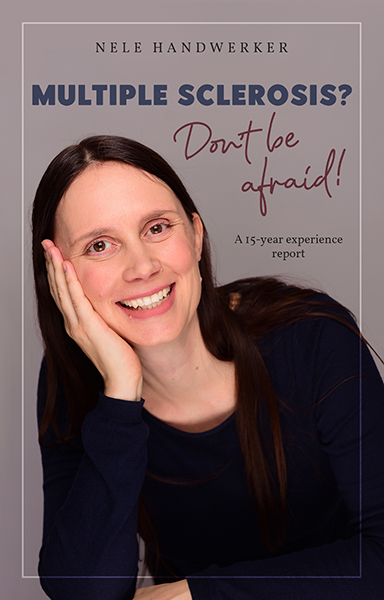This time I’m talking to Dominika Czarnota – Szałkowska about how people with multiple sclerosis can get the best support who live in Poland. Dominika has been working as Secretary General for the Polish Multiple Sclerosis Society for many years. And even so she is not affected by MS herself, she is an expert for available options when it comes to treatment but also for finding emotional and mental support.
Klicken Sie auf den unteren Button, um den Podcast zu laden.
Table of Contents
Introduction – Who is Dominika Czarnota – Szałkowska?
I am a psychologist, wife and mother of a 7-year-old boy named Gustaw. I love spending time with my family and friends. Relationships in general are of great importance to me. I believe that we should appreciate the good moments in our lives, memories of them will help us to deal with the bad moments someday. I like traveling, but frankly speaking I’m a lazy traveller, I like when it’s comfortable. So no hiking with a tent. 😉

Personal Experiences and Coping Strategies
What was your personal motivation to work for the Polish Multiple Sclerosis Society?
I started working at the information centre of the Polish MS Society as a psychology student and I thought it was a great opportunity to learn about the needs of people with MS and how I can support patients with neurological diseases.
In your experience, what are some of the most effective coping strategies or self-care practices for managing the daily challenges of living with MS?
People have different strategies for coping with difficulties and the one that works for them depends mainly on their personality, life experience and the support of close ones. The avoidance strategy is certainly the least productive. We are often approached by relatives or friends of people with MS asking how they can help their child, partner, friend, who sometimes does not even want to discuss treatment, not mentioning emotions. Depression is a very serious topic when it comes to MS. The hardest thing is to help people who refuse to receive this help. I believe that the attitude towards the daily challenges is of great importance in dealing with the disease. What I would recommend to everyone is to look for professional support, but also to take care of relationships with loved ones.
How important is mental health and emotional well-being for individuals with MS, and what support is available in this regard?
I believe mental health is the most important thing in life. You can be a happy person in a wheelchair or a very unhappy person with a 0 EDSS. Anxiety and depression in MS is a very complex subject as it can depend on many factors. It can be a reaction to the disease (diagnosis, worsening, daily difficulties), but also a symptom of the disease.
MS Treatment and Care in Poland
What types of MS treatments, therapies, or interventions are more commonly recommended or accessible in Poland?
All registered DMT’s are available and reimbursed. Last year, 4 new drugs were reimbursed and access to the so-called 2nd line is now easer. The problem is still the waiting time for the therapy to start (it looks different in different parts of the country). AHSCT (stem cell transplantation) was a hot topic a few years ago, now there is much less interest. This procedure is not reimbursed in Poland. Rehabilitation is an issue – there is limited availability and lack of comprehensiveness. Neurorehabilitation is particularly lacking. There is a shortage of psychologists and neuropsychologists in hospitals.
Are there any specific laws or regulations in Poland that protect the rights and promote the well-being of individuals living with MS?
The labour law in theory protects people with disabilities, but much depends on the attitude of employers.
Can you share any recent advancements or developments in MS treatment, care, or support in Poland that you find particularly promising?
As I have already mentioned, the therapeutic program was reformed last year, there is definitely greater access to it DMT’s. There is also a pilot program of coordinated care in MS, which includes the care of other specialists in one place, not only a neurologist and MS nurse (urologist, psychologist, physiotherapist).
Challenges and Support Systems in Poland
Can you provide an overview of the healthcare system in Poland and how it supports individuals living with MS?
The healthcare system in Poland is very bureaucratic and unfriendly to patients. Patients are often uninformed. They don’t know where to look for support. E.g. which hospitals run DMTs therapy. The issue of psychological and neuropsychological support is very neglected. Often people after the diagnosis are left on their own.
What types of healthcare professionals are typically involved in the care and management of MS in Poland, and what role do they play?
Primarily a neurologist and MS nurse, but also a physiotherapist, urologist, psychologist, psychiatrist, and ophthalmologist.
Are there any specific resources or support networks available for MS patients in Poland, such as patient associations or community organizations?
Of course, there is the Polish Multiple Sclerosis Society where I work. We are a large nationwide organization. For more information please visit our website: www.ptsr.org.pl In addition, there are many local ones, such as Sezam in Silesia (they have their own rehabilitation centre in Gliwice), or “StwardenieRozsiane.Info” Fundation in Pomerania (they operate more online, but once a year they organize a large two-day conference in Gdańsk for people with MS and their loved ones). Interesting information about the disease can also be found on the website of the „SM-walcz o się“ Foundation.
Are there additional challenges to living with MS when you are over 60?
It’s definitely hard to be a person with MS after 60. Unfortunately, often these people did not have a chance for effective treatment at an early stage of the disease and are not eligible for treatment now. They have to deal with comorbidities. Pension benefits are low.
MS Education, Awareness, and Advocacy
Are there any specific initiatives or programs in Poland that focus on raising awareness about MS and educating the public about the condition?
Polish Multiple Sclerosis Society offers quite a lot of initiatives. For example, workshops for young people with MS, for women planning pregnancies: :Being a mum with MS.” In the near future we want to focus on supporting parents of children living with MS. Our permanent activities include: free support of a neurologist, psychologist, lawyer, social worker, nutrician and MS nurse. We regularly organize various types of webinars, soon e.g. with a pharmacist on supplements and OTC drugs. Our branches organize additional rehabilitation.
Quickfire Q&A Session
Which website can you recommend for people living with MS in Poland?
What development would you like to see in the field of multiple sclerosis in the next 5 years?
New drugs that are more effective, safer to use and do not affect everyday life in a negative way. You can do whatever you want, travel wherever you want.
Farewell
Finally, what message of hope or encouragement would you like to share with individuals living with MS in Poland?
You have one life to live, don’t give up on it. Fight for your happiness. In Poland we say: you have to play with the cards that fate has given you. Try to make the best of it. In multiple sclerosis we are seeing enormous medical progress and this is very encouraging, I think. It may happen that you need support in various aspects of your life and an organization such as the Polish MS Society is here to provide it.
Many thanks to Dominika for providing so many great tips and sharing her knowledge and of course for all her efforts on improving the life of those living with Multiple Sclerosis in Poland.
See you soon and try to make the best out of your life,
Nele
For more information and positive thoughts, subscribe to my newsletter for free.
Click here for an overview of all podcast episodes published so far.

And at many more places.
* This text contains affiliate links. This means that I get a small compensation if you buy the product recommended by me through the link. For you nothing changes in the price of the product. And it helps me to pay for the blog and to write new posts.










